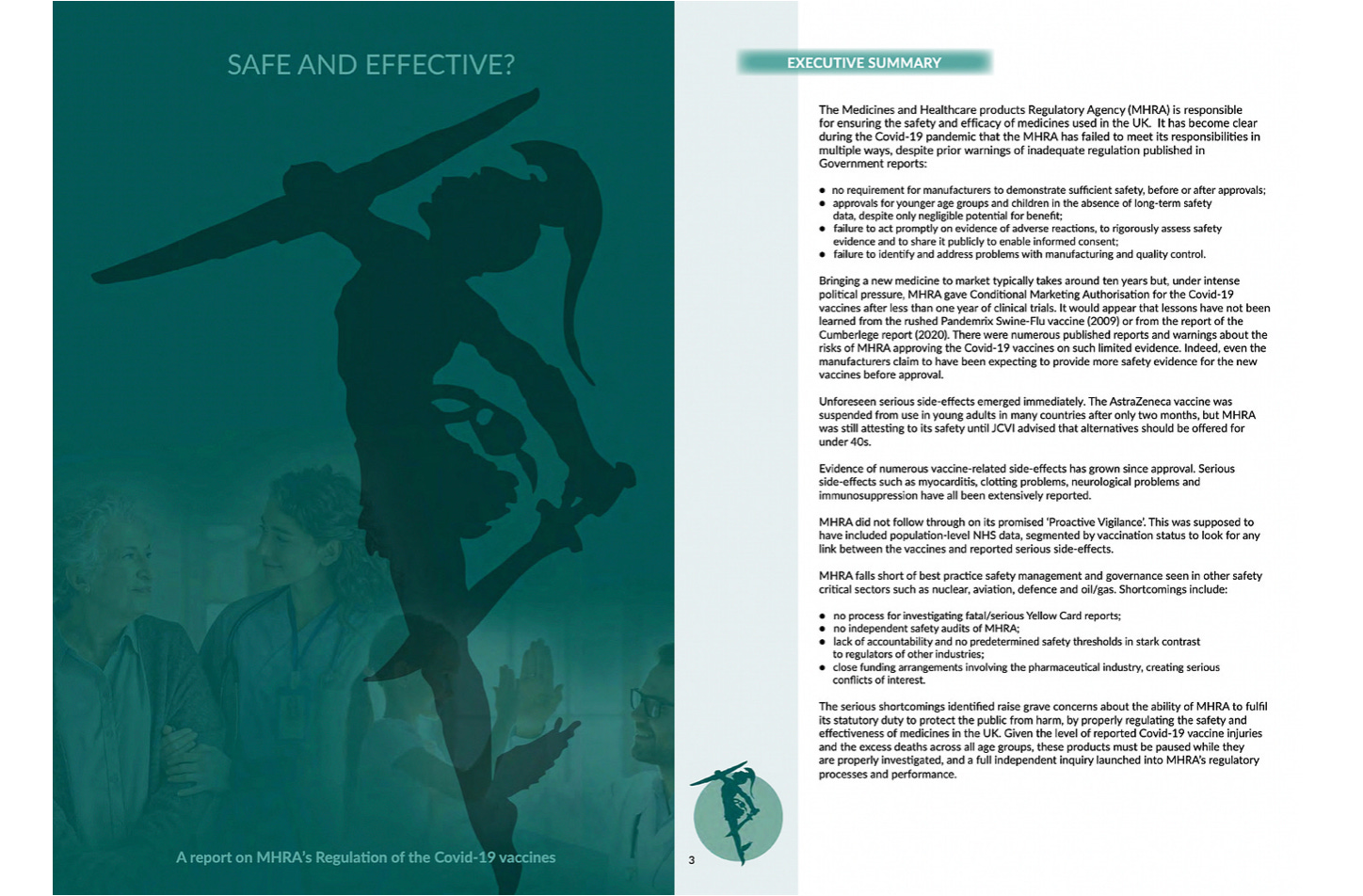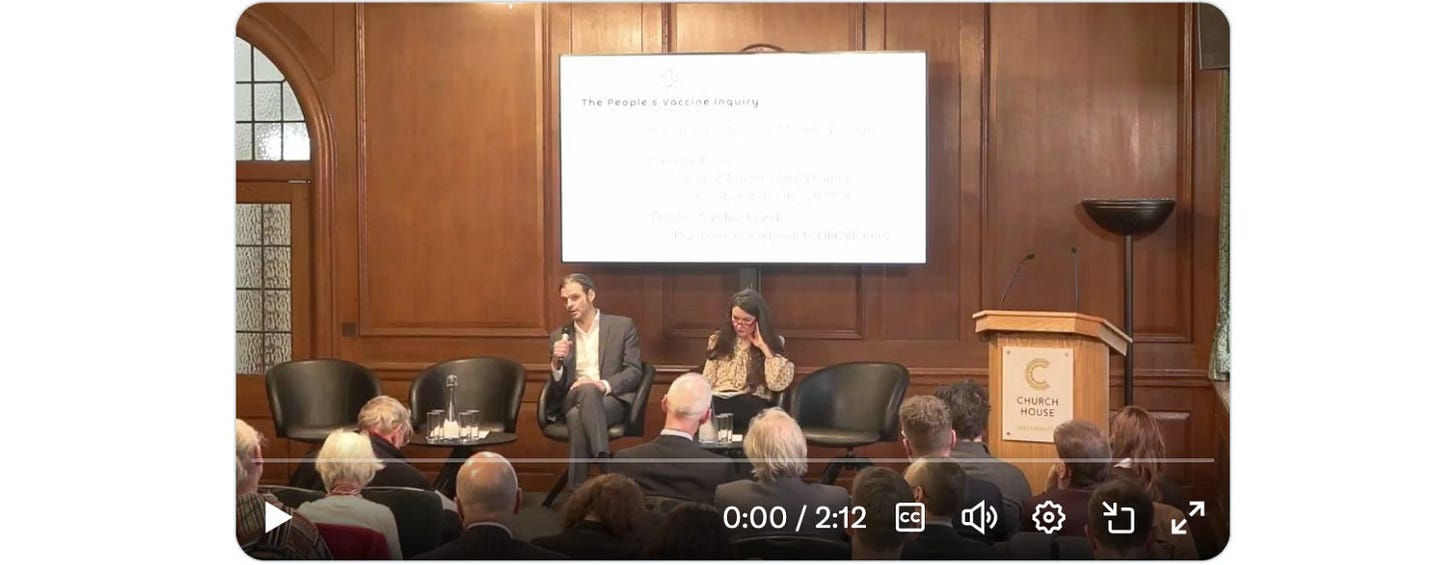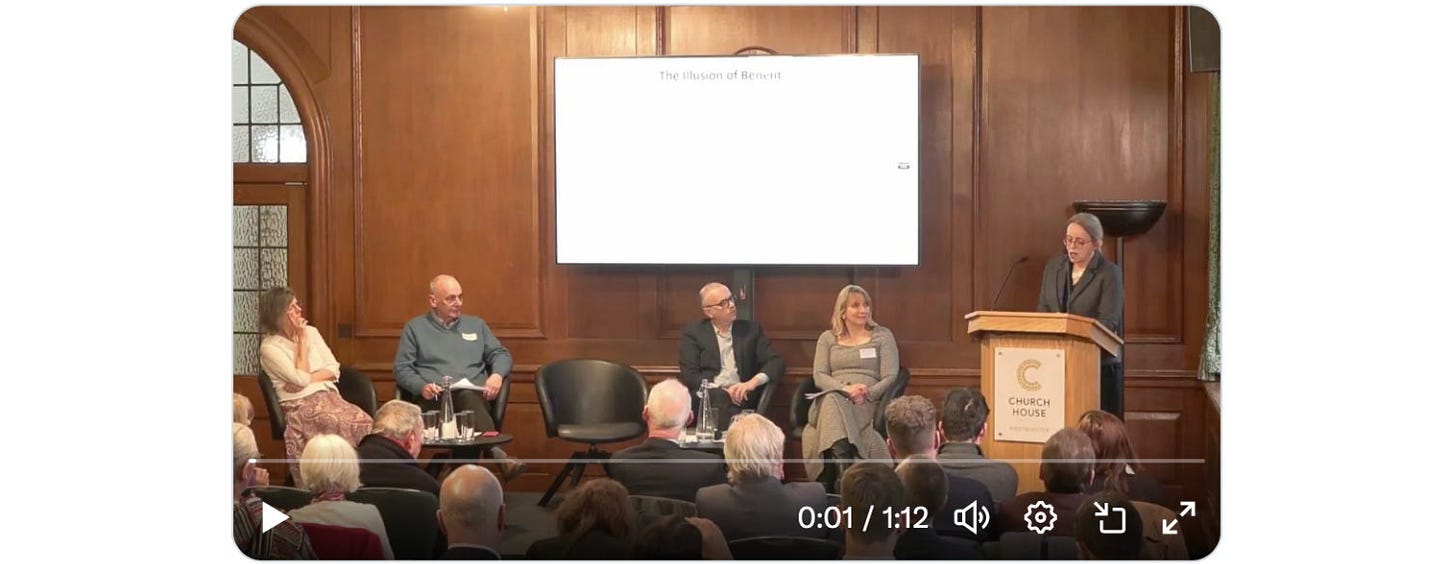[I] Exposing the UK Covid-19 Inquiry (Module 4)
Part I: the covid inquiry's censorship; clinical trials jabs versus rolled out jabs; core participant view of censorship of questions; shutting down witnesses
Dear Church Leaders (and everyone else)
The purpose of this post is to convey a flavour of what has been going on during Module 41 of the UK Covid-19 Inquiry.
Below are four short videos posted by the People’s Vaccine Inquiry that I originally featured in this post:
Transcripts are also provided.
I-1. The Covid Inquiry’s censorship [link]
Contributor: Dr Jonathan Engler, healthcare entrepreneur and Co-Chair of HART
[Engler] Despite their valiant efforts, the few dissenting voices who are allowed to speak are having their testimony constrained by both the questions asked and the answers they are permitted to give.
Here are some of the more egregious examples:
[Witness at the Inquiry] A normal process when a new medication is brought out is that they will make a mock-up of a medication or a vaccine for a clinical trial. And then once it’s been authorised they will then upscale and produce a product that can be mass-produced. Because the way… something is made for a clinical trial, you can’t mass-produce it. These particular vaccines are biologics. And there was a research study that said…
[Hugo Keith, lead lawyer at the Inquiry] “I’m so sorry, I’m going to have to interrupt you there. We don’t have the time or the wherewithal to be able to go into some of these areas in this sort of detail.”
[Engler] The fact that the manufacturing process for the rolled-out product was totally different from that given to nearly all the trial participants… this was essentially glossed over by June Raine [CEO of the MHRA] being asked the wrong question, which appeared deliberately designed to give the MHRA a way out:
[Keith] Some have suggested that the batches which were delivered to the United Kingdom for use amongst its population, which were then handed out, were not the same batches, or rather were batches that were produced by a different manufacturing process on the part of the manufacturer… as had been tested by the MHRA. So bluntly, the suggestion has been made [that] you tested and authorised and certified a certain number of vaccines made by… manufacturing process A. And then the manufacturers actually delivered vaccines to the British population produced as a result of a different manufacturing process [B], and one by inference which had not been tested. Is that right?
[Raine] Well, my understanding is that the manufacturing process would have been the same.
[Engler] Regulator decision-makers faced what can only be described as softball, mainly closed questions from Inquiry counsels, which appeared designed to support the official narrative, while preventing the need for further interrogation or supporting evidence.
More details on the two manufacturing processes can be found in this section of the Updates (Feb 2025) post.
I-2. Clinical trials jabs versus rolled out jabs [link]
On behalf of the Perseus Group who produced this report in April 2023:
A fundamental issues was the Process 1 v Process 2 issue, the fact that the covid vaccines rolled out were mass-produced using a very different process to the product tested in the clinical trials.
When you dig into this, they did actually compare the quality of the two products. But the regulators had some concerns with those comparative quality data. [And] they weren’t referenced in the Inquiry. And this runs across all three vaccines… it’s a process issue, not an individual vaccine issue. But even more importantly, they had no comparative safety data between the product used in the clinical trials and the one rolled out.
Just to expand on that… June Raine’s written statement said that the Process 2 mass-produced vaccines… [were included] in the Phase 3 clinical trial. That is true. Late on, they injected about 250 people with the Process 2 vaccine. But the inquiry failed to expose — despite having the evidence to back it up, confirmed by MHRA itself — that the results of that 250… little bit of trial were never published. So when they authorised the vaccines, they didn’t have any data, and they never did get it eventually.
Good questions would be: Why didn’t MHRA include, in its advice to Ministers, that issue?” …that there were some quality issues, differences between the two products, and the lack of comparative safety data. They also didn’t mention anything about DNA contamination, which is a well-known issue between the two processes, nor why MHRA didn’t measure that DNA contamination in its own independent batch testing.
I-3. Core participant view of censorship of questions [link]
Contributors: Caroline Pover, Chair of Trustees of UKCVFamily, and Dr Christian Buckland, psychological advisor to UKCVFamily
[Pover] Any questions that we wanted to submit… we wanted to ask… we wanted our barristers to ask — and this applied to everybody — all of those questions had to be submitted beforehand. So… already a few people have said, “Why weren’t these questions asked…?” This is the process that was involved. Those questions all had to be submitted beforehand. Some of those questions were approved. Some were asked by the Inquiry’s team. And some were not allowed.
So that’s why, if you saw, particularly our barrister, asking probably not the obvious question, there was a reason for that. It’s not a reflection on the barrister. It’s not a reflection on what we wanted to know. And it’s not a reflection of what our members wanted to know.
[Buckland] As Ros [Ros Maidment, retired NHS Consultant Paediatrician] was saying… shouting at the TV thinking, “Why are you not asking the questions that need to be asked?” …I think it’s so important, as Caroline has just also said… [that] they are pre-approved questions, which makes the Inquiry slightly different, because then it’s a controlled Inquiry rather than having people being able to cross-examine witnesses or ask difficult questions.
So that to me was a really important point… that people’s expectations, I think they had… more hope for the Inquiry than… was really going to happen. So that was quite difficult for me to see people’s distress at the questions being asked, and the question not being asked.
But also I think one thing that was really important was… when certain things were said which were clearly wrong, no-one was pulling them up on that. I think that was something that was really, really difficult. I sat there watching certain things, thinking, “Why is no-one challenging… Why is the person questioning not challenging certain things that were said that I was pretty sure are incorrect.”
[Pover] They weren’t allowed to is the short answer to that.
I-4. Shutting down witnesses [link]
Contributor: Dr Clare Craig, diagnostic pathologist and Co-Chair of HART
Other mentions of clinical trials were forbidden.
When Ruth O’Rafferty of the Scottish Vaccine Injury Group brought up the critically important differences between the trial product in the lab and the mass-produced product in the vats, Hugo Keith [the lead lawyer for the Inquiry] interrupted her, saying “I’m so sorry, I’m going to have to interrupt you there. We don’t have the time or the wherewithal to be able to go into some of these areas in this sort of detail.” [NB this is part of clip #1]
When Charlet Crichton of UKCVFamily mentioned participants being vaccine injured in the trials, and their data being scrubbed from the reports, he said, “Alright, I’m going to stop you there. We can’t be looking at individual cases.” That was a rule that did not apply to those with a covid label. Nor did Charlet in fact mention an individual case. She was talking about fundamental corruption and the only reliable measure we have of vaccine safety. And the counsel to the inquiry simply did not want to know. Nor did the Chair intervene to find out more.
[And] when Ruth O’Rafferty brought up regulatory failures outlined in a 2005 Parliamentary report, the recommendations of which have not been implemented, [Keith] said, “Alright, we’re in danger of veering off…”
Please do share the above with anyone you think might be interested. I doubt the mainstream media — much of which receives money from organisations with a financial interest in vaccines — will substantially challenge the way the Inquiry is being run.
By way of contrast, those working for the People’s Vaccine Inquiry are — as far as I know — giving their time for free and have no conflicts of interest.
For anyone wanting more detail, I recommend:
The People’s Vaccine Inquiry Press Conference from 4th February
These summaries from HART and the UKMFA (UK Medical Freedom Alliance)
This overview from UK citizen journalist JJ Starky:
Update: link to Part [II]
Related:
Dear Church Leaders most-read articles
Some posts, including a version of this one, can also be found on Unexpected Turns
The Big Reveal: Christianity carefully considered as the solution to a problem
“Vaccines and therapeutics”










![[II] Exposing the UK Covid-19 Inquiry (Module 4)](https://substackcdn.com/image/fetch/w_140,h_140,c_fill,f_auto,q_auto:good,fl_progressive:steep,g_auto/https%3A%2F%2Fsubstack-post-media.s3.amazonaws.com%2Fpublic%2Fimages%2F1796b701-1eeb-4906-83ad-572a867613fc_858x864.png)


